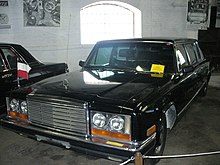ZIL-4104
| ZIL-4104 | |
|---|---|
 | |
| Overview | |
| Manufacturer | Zavod Imeni Likhacheva |
| Production |
|
| Assembly | Likhachov Plant, Moscow, USSR |
| Body and chassis | |
| Class | Luxury car |
| Layout | FR layout |
| Powertrain | |
| Engine | 7.7L ZIL-4104 V8 |
| Transmission |
|
| Chronology | |
| Predecessor | ZIL-117 (ZIL-115) ZIL-114 (ZIL-4104) |
| Successor | ZIL-41041 (ZIL-115) ZIL-41047 (ZIL-4104/41045) ZIL-41052 (ZIL-4105/41051) |

The ZIL-4104 was a limousine built by ZIL from the late 1970s to the early 1980s, when it served as the transport of the elite of the Soviet Union. It is estimated that no more than fifty cars were produced each year.
Originally designated ZIL-115,[1] the ZIL-4104 was an update of the ZIL-114 with which it shared the same chassis and over half its mechanical components.[2] Despite sharing the same chassis, the ZIL-4104 was as much as 314 kg (692 lb) heavier than the 114.
-
ZIL-115 (year 2018)
Mechanically, the ZIL-4104 also improved on the 114. The pushrod V8 engine of the 114 had its stroke increased from 95 mm (3.7 in) to 105 mm (4.1 in). With a 108 mm (4.3 in) bore, this meant the capacity increased from 6,959 cc (424.7 cu in) to 7,695 cc (469.6 cu in),[3] which was throughout the model's lifespan one of the world's biggest passenger-car engines (Cadillac produced a 472 cu in (7,730 cc) engine, enlarged to 500 cu in (8,200 cc)). This engine developed 315 hp SAE Gross at 4,400 revs per minute and a substantial 608 N⋅m (448 lb⋅ft) at 2500 rpm.[4] The car weighs 3,400 kg (7,500 lb), is 6,339 mm (249.6 in) long, 2,068 mm (81.4 in) wide, and 1,500 mm (59 in) high.
Among its special features were special laminated windscreen and triple-layered windows, supposedly offering protection from radiation in case of nuclear attack, plus duplicated systems, including dual ignition, two 74-amp batteries in parallel, and two fuel pumps.[5]
The console and dash were covered with Karelian birch 10 mm (0.39 in) thick, and the rear seat controlled radio (a Riga receiver), power windows, heater, and air conditioner; in the console in front was a Vilma cassette player.[6]
The fuel tank was 120 L (32 US gal; 26 imp gal) and the car used leaded 95 octane petrol, getting 22 L/100 km (11 mpg‑US; 13 mpg‑imp).[7]
By 1984, a new three-speed automatic transmission had replaced the much outdated two-speed type that had been used by ZIL dating back to the first ZIL-111 in 1958.
As official state cars, the ZIL-4104s were "built under conditions of strict secrecy" and were "maintained in closed garages by a special division of the KGB", with everyone involved in building and servicing them sworn to secrecy.[8]
Variants
- ZIL-4104: Base model. Also known as ZIL-115; produced 1978-1983.
- ZIL-4105: Armored version of ZIL-4104.
- ZIL-41042: Ambulance version. Also known as ZIL-115A.
- ZIL-41043: As ZIL-41042 except with communications equipment.
- ZIL-41044: Short wheelbase convertible version.
- ZIL-41045: Restyled ZIL-4104. Produced 1983-1985.
- ZIL-41046: Radio car version.
- ZIL-41048: ZIL-4104 with automatic climate control. Produced in 1984.
- ZIL-41051:Armored version of ZIL-41045.
ZIL-41044 and ZIL-41042
In the later years of the 4104 production run, ZIL introduced two derived models based on the 4104 chassis and the shortened ZIL-117 chassis not previously used with the 7.7 litre engine.
- The 41044 was a shorter-wheelbase convertible. Unlike previous ZIL convertibles, it had only two doors but otherwise it was typically ZIL.
- The 41042 was a rare station wagon produced by ZIL, but the few examples built were used as ambulances for general secretaries in the Soviet Union.
Notes
Sources
- Thompson, Andy. Cars of the Soviet Union. Somerset, UK: Haynes Publishing, 2008.



